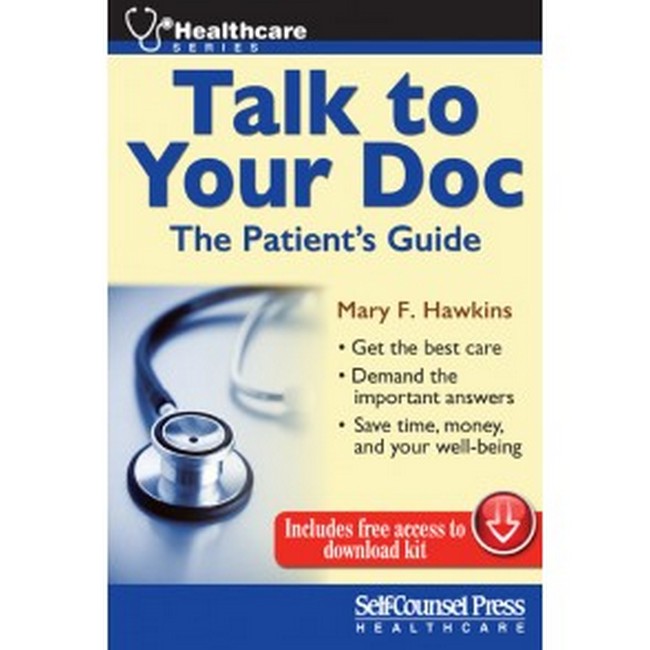Preface xvIntroduction xvii1 The Changing Health-care System 11. General Practitioners 32. Hospitals 43. Walk-in Clinics 54. Health-Insurance Plans 55. Ambulatory Care 66. Home Care 67. Meals on Wheels 78. Palliative Care 79. Other Community-Based Programs 99.1 Mental health care 99.2 Pharmacare 109.3 Virtual medicine 10vi Talk to Your Doc10. The Health-care Team 1111. The Limitations of the System 142 Knowing Yourself 191. Know Your Body 212. Know Your Communication Style 222.1 Gathering information 222.2 Perceiving, organizing, and interpreting information 242.3 Listen to yourself and the doctor 252.4 Attending to information 252.5 Paraphrasing 272.6 Listening too hard 292.7 Selective listening 302.8 Listening with memory aids 323. Talk to the Doctor 323.1 Assertive delivery 343.2 Nonassertive delivery 353.3 Aggressive delivery 363 Understanding Your Relationshipwith Your Doctor 391. Dependency and Vulnerability 392. Patient Expectations of the Doctor 423. What Kind of a Relationship Do You Wantwith Your Doctor? 433.1 Attitude considerations 443.2 Value considerations 453.3 Behavior considerations 474. Be an Active Participant in Your Health Care 484.1 Taking action 484.2 Educating yourself 494.3 Avoiding taking action 505. Are You and Your Doctor a ""Good Fit""? 52Contents vii4 Communicating with Your Doctor 571. Finding a Common Language 571.1 Using metaphors 591.2 Using humor 601.3 Communicating with an aloof doctor 612. What Your Doctor Should Know 632.1 Family medical history 632.2 Communicating discomfort 642.3 Discussing physical symptoms 652.4 Communicating about emotional symptoms 662.5 Mental disorders and feeling alone 672.6 Lifestyle challenges 682.7 Life support choices 683. The Challenge of Remembering 693.1 Forgetting the reason for your visit 703.2 Forgetting to visit the doctor 713.3 Forgetting how to describe the pain 714. When You and Your Doctor Disagree 724.1 Making sure you are heard 734.2 Negotiating differences of opinions 744.3 Negotiating your position 765. When You Are Dissatisfied or Satisfied 805.1 Feeling ignored and dissatisfied 805.2 Feeling disrespected 815.3 Feeling rushed 835.4 Feeling violated 845.5 Feeling satisfied 855 Communicating on Behalf of Others 891. Communicating on Behalf of Children 901.1 Younger children 901.2 Older children 91viii Talk to Your Doc2. Communicating on Behalf of the Elderly 932.1 When couples communicate for one another 942.2 When the issue is more than just health 962.3 Communicating on behalf of someone withhearing loss 962.4 When an elderly person has concerns 983. Communicating on Behalf of Someone Who IsTerminally Ill 1003.1 When the person is in denial about dying 1003.2 When the person wants to die at home 1024. Communicating on Behalf of People with Languageand Cultural Barriers 1034.1 When language and culture barriers exist 1044.2 Overcoming the language and culture gap 1056 Beyond the Routine Checkup 1071. Prescribed Drugs 1081.1 Drug reactions or side effects 1081.2 Over-the-counter drugs 1101.3 Staying with the regimen 1112. When You Prefer Alternative Medicines or Therapies 1133. When the Doctor Is Away 1164. When You Are Being Sent for Tests 1175. Being Referred to a Specialist 1206. What to Do When a Health-care Crisis Happens 1227. Chronic Health Problems 1238. Understanding Illness 1249. Building a Support Network 1259.1 Personal support groups 12710. When Doctors Have No Answers 12911. When You Should Get a Second Opinion 129Contents ix7 Searching for a New Doctor 1311. Approaches to Looking for a Doctor 1321.1 Be prepared 1321.2 Use a positive approach 1341.3 Find someone you're comfortable with seeing 1351.4 Decide what is important for you 1361.5 Similar views on treatment 1381.6 Good communication is important 1408 Beyond Face-to-Face Communication 1451. Internet, Email, and Health Care 1462. Interacting with Doctors in the Future 1462.1 What is telemedicine? 1472.2 Patients' response to telemedicine 1522.3 Occasional doctor resistance to telemedicine 1523. Closing the Communication Gap 154Resources 1551. United States 1551.1 Medical associations 1551.2 Other informative US websites 1562. Canada 1562.1 Medical associations 1562.2 Other informative Canadian websites 1573. Disease-Specific Websites 1574. Internet Support Groups 1595. Virtual Medical and Telemedicine Websites 1596. Additional Reading 1606.1 Books 1606.2 Self-Counsel Press Eldercare Series 1606.3 Websites 161Download Kit 163x Talk to Your DocChecklists1. Do You Know What's Available? 172. What Kind of Patient Are You? 233. How Do You Gather Information? 244. Not Listening 315. What Kind of Listener Are You? 336. What Type of Communication Style Do You Use? 387. Do You Take an Active Role? 488. Are You an Inactive Participant? 519. The Pros and Cons of Your Relationship with Your Doctor 5510. Do You and Your Doctor Have a Good Relationship? 5611. Do You Communicate with Your Doctor Effectively? 8712. Ask the Doctor or Pharmacist about Medications Prescription and Over-the-Counter 11213. Questions to Ask a Homeopathic or Naturopathic Doctoror Pharmacist 11514. What to Ask the Doctor about Your Tests 12015. What to Ask the Specialist 12116. Ask the Doctor 12617. Questions to Ask a Potential New Doctor 142

